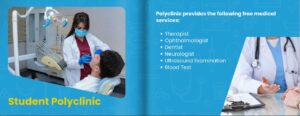STUDENT POLYCLINIC
About the polyclinic
Currently, protecting and strengthening the health of students in our country is of great medical, social and public importance.
Student polyclinics operate in all HEI (Higher Education Institutions) including UNEC. One of the main tasks of the polyclinic is early diagnosis and prevention of diseases, promotion of a healthy lifestyle.
Number of diseases such as – myopia, postural disorders, scoliosis, osteochondrosis, neuro-vascular dystonia, astheno-neurotic disorders, exchange disorders have led to an increase in pathological conditions and diseases among students in recents years. The reasons for this are strained vision (including general computerization, mobile phones, etc.), passive static tension, low, irregular and unbalanced nutrition, sleep and rest regime violations.
Dispensary
The most important task of the polyclinic is the dispensation of students every year. The main purpose of dispensation is to detect non-infectious diseases that lead to disability and premature death.
Preventive measures, early detection of diseases, timely and correct diagnosis make it possible to significantly reduce the causes of chronic non-infectious diseases, as well as the severity of the course of the disease and the frequency of complications of those already suffering from such diseases.
The polyclinic doctor provides assistance to the patient when the disease is detected or sends the patient to a medical institution with a suitable profile for treatment if there is no necessary facility, necessary equipment and specialist at the polyclinic. The polyclinic doctor monitors the subsequent treatment of the patient and enters all the information in the outpatient card.
Fluorographic examination of students is one of the important components of dispensation. The large number of students and the lack of a fluorescent device sometimes cause difficulties in conducting this examination. We hope that this problem will be solved with the increase in the number of fluorescent devices in the city.
The status of the polyclinic
The student polyclinic, must meet all modern requirements like any city polyclinic.
Formally, student polyclinics are subordinate to the Main Health Department of the city of Baku and legally have nothing to do with HEIs. At the same time, polyclinics are in the premises of the HEI: a certain amount of some of the equipment and medicines are purchased by the HEI.
Some large HEIs are in several academic buildings. Since these buildings are located in separate parts of the city, according to tradition, medical centers are organized in these buildings using the staff of polyclinics. Each health post has one nurse and the posts have a minimum supply of medicines. Equipment, devices and medical instruments correspond to the profile of the medical institution and the doctors working there.
Although they are “student” polyclinics and, therefore, formally, serve only students, every day the teachers and staff of HEİ also turn to the polyclinics for medical assistance and are provided with appropriate assistance. Cardiovascular and nervous system diseases are the main reasons why HEİ employees go to the polyclinic. Urgent help is often provided to both students and employees. Before being sent to specialized medical institutions, the list of medicines allocated to student polyclinics for first aid to patients has been expanded. İt includes anti-shock, anti-convulsant and pain-relieving drugs.
When a student applies for health reasons, the polyclinic doctors examine the student, and a certificate of exemption from classes (form 095) is issued if any disease is detected.
Residents of Baku city are given a one-day medical certificate and are sent to the polyclinic located at their place of residence to continue treatment.
Residents of the region and foreign citizens are issued a one-day certificate of exemption from classes, and if necessary, assistance is provided to continue treatment in other specialized medical institutions.
The e-health program is currently being developed and implemented. Student polyclinics are equipped with computers. This creates conditions for the active use of computer and electronic technologies. For example, the organization of electronic cards of students; online consultation and appointment with a doctor; communication between buildings; creation of an electronic database of the draft contingent, etc.
The head physician Aybaniz Hajiyeva has been in charge of Student Polyclinic No. 3. since July 2015
Team
Chief physician – Ukalayeva Adila Zeynaddin
Therapists – Abdullayeva Tamilla, Gafarov Jabir
Surgeon – Ibrahimova Gular
Cardiologist
ENT
Dentist – Alili Zahra
Ophthalmologist – Aslanli Aytan
Neuropathologist – Mukhtarova Mehriban
Doctor – laboratory assistant – Gulamova Telli
X-ray cabinet (X-ray)
USM – Mustafayeva Aygun
Nurses – Abuzarova Arzu, Jafarova Intizar, Yunisova Nazakat, Karimova Aida, Karimova Parvin, Aghayeva Seyidkhanim, Almazova Gulnara, Nasirli Fidan, Mustafayeva Leyla
Junior medical staff – Guliyeva Farida, Huseynova Targul
Registrar – Mammadova Farah






